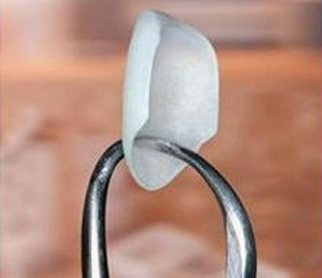Last week after my dental cleaning and exam, my dentist told me that I have a periapical abscess on my left incisor. I told the hygienist about the pain in the tooth, so after the x-ray, my dentist explained the problem. My concern is that the abscess is on a root canal tooth, and my dentist is referring me to an endodontist. I am concerned that the veneer will break, the tooth will turn dark, or I will lose both and need an implant. My dentist said everything would be okay, but she seemed casual about it. What are my risks? Thank you. Isabella from TN
Isabella,
Thank you for your question. Root canal treatment on a porcelain veneer tooth is rare, so we are concerned about what caused the tooth abscess. An abscess is an infection at the root tip that can spread to the bone without treatment. So, treating it is a priority.
Why Would a Porcelain Veneer Tooth Require Root Canal?
A porcelain veneer tooth may require root canal treatment if a dentist aggressively prepares the tooth. Aggressive preparation can result in more significant stress, irritation, and inflammation on a tooth. Infection can result, and then you would need root canal treatment. Also, if bacteria leak behind the veneer, it can lead to an infection that if left untreated requires root canal treatment. Still, regardless of the cause, delaying treatment will make things worse.
How Will a Root Canal Affect a Porcelain Veneer Tooth?
Root canal treatment darkens any tooth. The root canal filling material causes most of the discoloration. A porcelain veneer has some translucence, and the darkness will show through it. However, your dentist can minimize the discoloration with these steps:
- Clean out root canal filling material from the tooth crown (the portion above the gumline)
- Place a white, flexible fiberglass post into the root
- Fill the space with a light shade of dental composite
Usually, cleaning out the root canal filler material from the crown and filling lasts five or ten years.
Will root canal damage the veneer?

Root canal treatment will not damage a well-bonded porcelain veneer
Root canal treatment would not loosen or damage your porcelain veneer if the dentist who placed your veneers bonded them correctly. And unless the endodontist sees that the condition of your tooth is dire, you will not need a dental implant.
If you still have concerns about your tooth and veneer, consider scheduling a second-opinion appointment with a skilled cosmetic dentist.
Dr. David Finley, an accredited Fellow of cosmetic dentistry in Monroe, Louisiana, sponsors this post.





